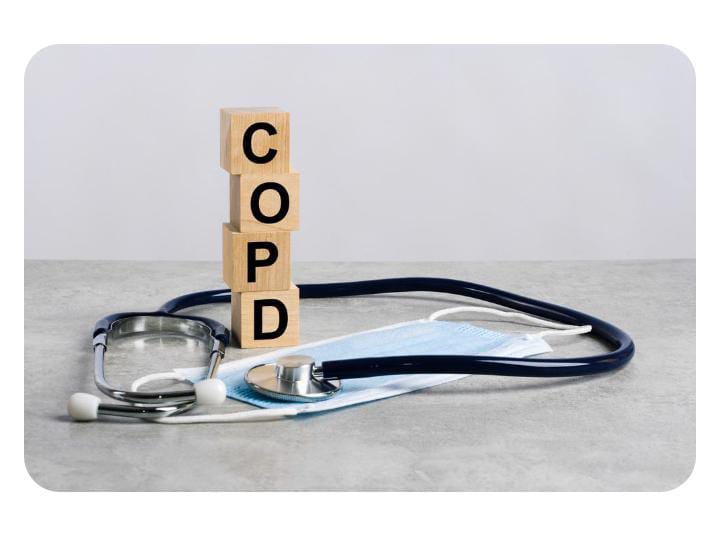COPD: Chronic obstructive pulmonary disease (COPD) is a term for serious lung conditions that impact the airways. It causes the airways to become narrowed, blocked, and inflamed, leading to breathing difficulties. Smoking and exposure to secondhand smoke are major causes of COPD, often severely harming lung function.
How does smoking contribute to COPD as the leading cause?
When you smoke, you inhale cigarette smoke deep into your lungs, where it causes harm. Cigarette smoke contains around 70 chemicals known to cause cancer, which can damage the airways and tiny sacs, or alveoli, within the lungs. These small air sacs are essential for taking in oxygen, but smoking disrupts their function and structure, leading to severe respiratory issues. This kind of lung damage is similar to what occurs in conditions like COPD, where airflow becomes restricted, making it harder to breathe over time.
Smoking not only contributes to COPD lung disease but also leads to a range of other health problems. It can impair your quality of life, weaken your immune system, and increase your risk of heart disease, stroke, and several types of cancer. If you smoke, it’s worth talking to your doctor about quitting and other ways to improve your overall health.
If you smoked as a teenager or were exposed to secondhand smoke as a child, it may have affected your lung growth and development. This can also raise your risk of developing COPD as an adult. Consult the best COPD hospital in Coimbatore if you are facing issues with lung health.
What causes COPD?
Repeated exposure to lung irritants such as tobacco smoke or chemicals can damage your lungs and airways over time. This long-term damage can lead to chronic obstructive pulmonary disease (COPD), which includes chronic bronchitis and emphysema. While smoking is the leading cause of COPD, about 1 in 4 people with the condition have never smoked.
How do smokers get COPD?
Studies reveal that smoking is responsible for 79% of all COPD cases. The situation is similar,, where around a quarter of smoker-related deaths are due to COPD. A chronic illness, COPD affects about 251 million people worldwide.
Does every smoker be affected by COPD?
Not all smokers, even heavy ones, develop COPD. Research indicates that those who have never smoked account for over one-third of COPD instances. This is because other factors can contribute to the development of the condition.
What happens when someone smokes with COPD?
If you’ve been diagnosed with COPD, your family doctor will advise you to quit smoking. This gives you the best chance to manage and treat your symptoms. One study showed that quitting smoking greatly lowered the risk of hospitalization and death for COPD patients, and former smokers had much better outcomes than those who continued smoking after their diagnosis.
If you’re unable or unwilling to quit smoking, it may worsen your lung disease symptoms and lead to more flare-ups. This can increase your chances of needing hospital treatment, negatively impact your quality of life, and reduce your life expectancy.
How does smoking affect lung function?
Most cases of lung cancer and COPD are caused by cigarette smoking, which is also the leading cause of avoidable deaths. Each puff of a cigarette delivers thousands of harmful chemicals that immediately impact the body. These toxic fumes enter the lungs, quickly move into the bloodstream, and are carried throughout the body, spreading the damage.
Tobacco smoke contains carbon monoxide, which reduces the amount of oxygen in your blood. This means less oxygen is delivered to your body’s organs as the blood circulates, leaving them deprived.
Cigarette smoke also contains acrolein, a chemical that can cause permanent lung damage, even in tiny amounts.
Cigarettes can contain bronchodilators, chemicals that open up the airways in the lungs, allowing them to absorb even more harmful substances.
Beyond introducing dangerous chemicals, smoking also damages the lungs in other ways. It eliminates the cilia, which are microscopic hairs in the airways that aid in lung cleanliness. Without these cilia, smokers may develop a persistent cough, known as a ‘smoker’s cough.’ You can have severe smoking side effects to COPD, breathing problems, and, in severe cases, death due to lack of oxygen. Reach out to the best pulmonologist in Coimbatore to restore your optimal lung health.
Does quitting smoking help?
Quitting smoking is essential. While it can’t reverse lung damage already done, it can stop further harm and improve quality of life.
When you stop smoking, your body becomes better at fighting diseases and lung infections. This can result in improved lung function, reduced symptoms, and fewer flare-ups.
Within 1 to 9 months of quitting, people with lung disease often notice improvements in their cough, sinus congestion, shortness of breath, and fatigue. They also have more energy to enjoy life and feel healthier.
Important Takeaway
A dangerous lung ailment frequently associated with smoking is COPD. Continuing to smoke with COPD can make the disease worse and lead to flare-ups, where signs and symptoms suddenly get worse.
Quitting smoking is the best strategy to avoid or prevent it from growing worse. There are medications and other resources available to help people quit and manage nicotine cravings. If you’re ready to quit, talk to your doctor for guidance and support.




